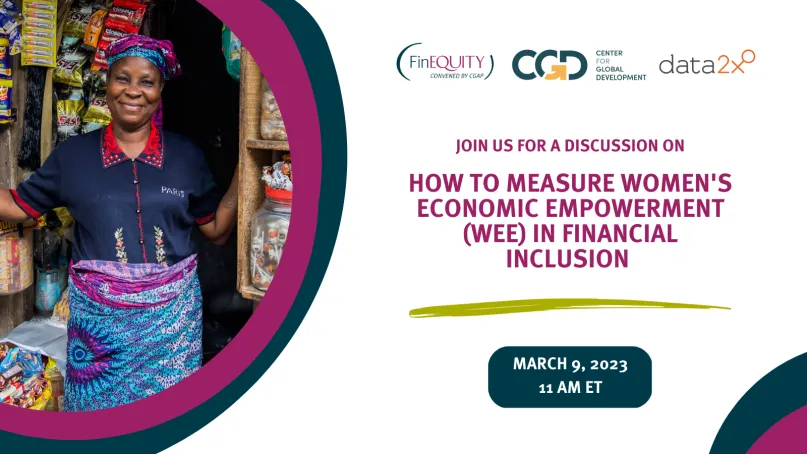How to Measure Women's Economic Empowerment (WEE) in Financial Inclusion

Developing and using commonly agreed upon Women’s Economic Empowerment (WEE) indicators is critical to helping stakeholders understand the outcomes of financial inclusion (FI) on women, how these outcomes are being achieved, and to better identify what works and what does not in promoting women’s economic empowerment through financial inclusion. While there are several initiatives examining WEE, commonly accepted guidance for measuring WEE in financial inclusion does not yet exist.
This past year, FinEquity, together with the Center for Global Development (CGD) and Data2X, as well as a core group of advisors, met to develop a standard approach to measuring WEE within FI programs and initiatives. Following an almost year-long learning process, a Theory of Change was developed, along with a core set of indicators to measure WEE in FI. This process and the indicators are outlined in a newly published background paper.
In the webinar, participants learned more about this process. They also heard from members of the core group of advisors, who shared their frameworks and lessons learned from measuring WEE in FI within their organizations and discussed the proposed core indicators.
About this event
Online

Jenny Morgan
Jenny Morgan is FinEquity's Impact Pathways Thematic Lead. She has over 15 years of experience in inclusive financial growth, entrepreneurship and small business development, women’s economic empowerment, and resilience.

Megan O'Donnell
Megan O'Donnell is a policy fellow at the Center for Global Development and co-director of CGD's gender equality and inclusion research program. Her work focuses on the care economy, social protection, women's economic empowerment, gender data and measurement, and development effectiveness.

Rathi Mani-Kandt
Rathi Mani-Kandt is the Head of Women's Economic Empowerment at CARE USA. She has over 15 years of experience designing products and services for low-income populations. Her focus at CARE is on designing products and services to grow women-owned micro and small businesses.

Solange Hai
Solange Hai is Senior Technical Lead and Program Manager at CARE. Her professional and research interests include gender transformative change, women’s entrepreneurship, and social enterprises. Before joining CARE, Solange worked in Spain and Latin America as a researcher and agricultural economist in programs ranging from smallholder farmer capacity-building to policy development.

Justin Archer
Justin Archer is the Lead for Global Quantitative Research at Women's World Banking. Prior to joining the organization, he worked as a research consultant for the World Bank, Population Services International, Marie Stopes International, and many other international development organizations. Before consulting, he lived in Ghana for 2 years while managing micro-savings RCT projects for Innovations for Poverty Action. He received a Master's of Science in Public Policy and Management from the Heinz College at Carnegie Mellon University and a Bachelor of Arts in Economics from Gettysburg College.

Megan Morris
Megan Morris is a Policy Manager at J-PAL Global where she manages the Gender sector and Finance sector. Megan synthesizes lessons from the global evidence base on gender and financial inclusion topics, and works with NGOs, foundations, and policymakers to develop research partnerships and support evidence-informed policymaking. She also supports J-PAL's efforts to grow and diversify its researcher network. Prior to joining J-PAL in 2021, she worked as a graduate research assistant at the University of Texas at Austin. Megan also managed a small non-profit working on women’s empowerment in Peru, and previously as a policy analyst in Washington State. Megan holds a Masters of Global Policy Studies from The University of Texas at Austin and a Bachelor of Arts in Economics from Seattle University.